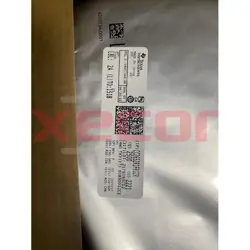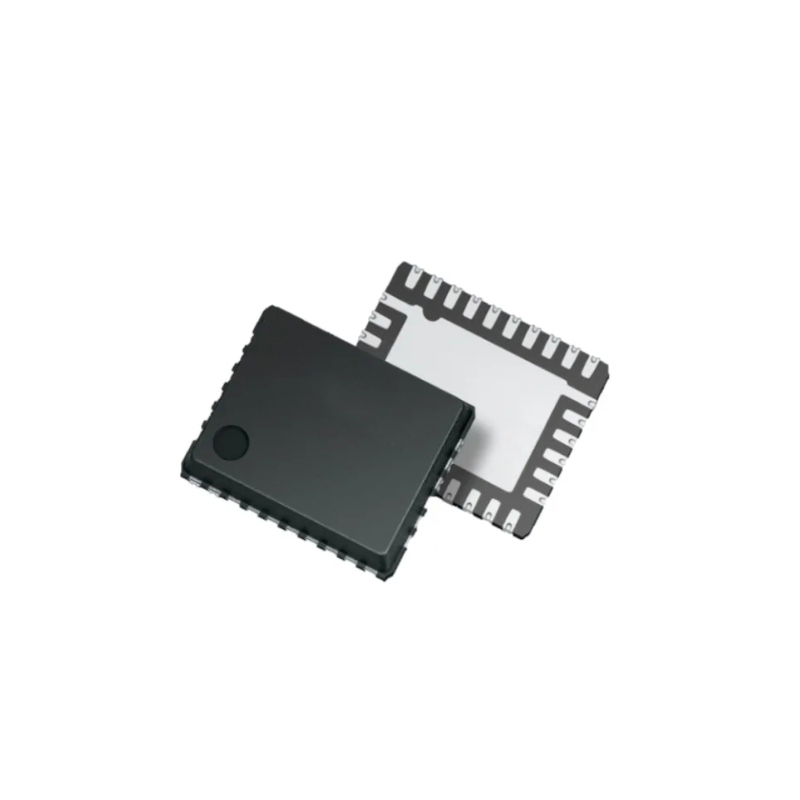CC1350F128RSMR
WLAN+BT+ZigBee Chip 2400MHz 32-Pin VQFN EP T/R
| Quantity | Unit Price(USD) | Ext. Price |
|---|---|---|
| 1 | $19.047 | $19.05 |
| 200 | $7.371 | $1,474.20 |
| 500 | $7.112 | $3,556.00 |
| 1000 | $6.985 | $6,985.00 |
Inventory:8,513
- 90-day after-sales guarantee
- 365 Days Quality Guarantee
- Genuine Product Guarantee
- 7*24 hours service quarantee
-
Part Number : CC1350F128RSMR
-
Package/Case : VQFN-32
-
Brands : TI
-
Components Categories : RF Transceiver ICs
-
Datesheet : CC1350F128RSMR DataSheet (PDF)
Overview of CC1350F128RSMR
The CC1350 device is a cost-effective, ultra-low-power, dual-band RF device from Texas Instruments™ that is part of the SimpleLink™ microcontroller (MCU) platform. The platform consists of Wi-Fi®, Bluetooth® low energy, Sub-1 GHz, Ethernet, Zigbee®, Thread, and host MCUs. These devices all share a common, easy-to-use development environment with a single core software development kit (SDK) and a rich tool set. A one-time integration of the SimpleLink platform enables users to add any combination of devices from the portfolio into their design, allowing 100 percent code reuse when design requirements change. For more information, visit www.ti.com/simplelink.
With very low active RF and MCU current consumption, in addition to flexible low-power modes, the device provides excellent battery life and allows long-range operation on small coin-cell batteries and in energy harvesting applications.
The CC1350 is a device in the CC13xx and CC26xx family of cost-effective, ultra-low-power wireless MCUs capable of handling both Sub-1 GHz and 2.4-GHz RF frequencies. The CC1350 device combines a flexible, very low-power RF transceiver with a powerful 48-MHz Arm® Cortex®-M3 microcontroller in a platform supporting multiple physical layers and RF standards. A dedicated Radio Controller (Cortex®-M0) handles low-level RF protocol commands that are stored in ROM or RAM, thus ensuring ultra-low power and flexibility to handle both Sub-1 GHz protocols and 2.4 GHz protocols (for example Bluetooth low energy). This enables the combination of a Sub-1 GHz communication solution that offers the best possible RF range together with a Bluetooth low energy smartphone connection that enables great user experience through a phone application. The Sub-1 GHz only device in this family is the CC1310.
The CC1350 device is a highly integrated, true single-chip solution incorporating a complete RF system and an on-chip DC/DC converter.
Sensors can be handled in a very low-power manner by a dedicated autonomous ultra-low-power MCU that can be configured to handle analog and digital sensors; thus the main MCU (Arm® Cortex®-M3) can maximize sleep time.
The power and clock management and radio systems of the CC1350 device require specific configuration and handling by software to operate correctly, which has been implemented in the TI-RTOS. TI recommends using this software framework for all application development on the device. The complete TI-RTOS and device drivers are offered free of charge in source code.
Key Features
- World’s First Dual-Band (Sub-1 GHz and 2.4 GHz) Wireless Microcontroller
- Microcontroller
- Powerful Arm® Cortex®-M3 Processor
- EEMBC CoreMark® Score: 142
- EEMBC ULPBench™ Score: 158
- Clock Speed up to 48-MHz
- 128KB of In-System Programmable Flash
- 8KB of SRAM for Cache
(or as General-Purpose RAM) - 20KB of Ultra-Low-Leakage SRAM
- 2-Pin cJTAG and JTAG Debugging
- Supports Over-the-Air (OTA) Update
- Ultra-Low-Power Sensor Controller
- Can Run Autonomously From the Rest of the System
- 16-Bit Architecture
- 2KB of Ultra-Low-Leakage SRAM for Code and Data
- Efficient Code-Size Architecture, Placing Parts of
TI-RTOS, Drivers, Bluetooth® low energy Controller and Bootloader in ROM - RoHS-Compliant Package
- 7-mm × 7-mm RGZ VQFN48 (30 GPIOs)
- 5-mm × 5-mm RHB VQFN32 (15 GPIOs)
- 4-mm × 4-mm RSM VQFN32 (10 GPIOs)
- Peripherals
- All Digital Peripheral Pins Can Be Routed to Any GPIO
- Four General-Purpose Timer Modules
(Eight 16-Bit or Four 32-Bit Timers, PWM Each) - 12-Bit ADC, 200 ksamples/s, 8-Channel Analog MUX
- Continuous Time Comparator
- Ultra-Low-Power Clocked Comparator
- Programmable Current Source
- UART
- 2× SSI (SPI, MICROWIRE, TI)
- I2C, I2S
- Real-Time Clock (RTC)
- AES-128 Security Module
- True Random Number Generator (TRNG)
- Support for Eight Capacitive Sensing Buttons
- Integrated Temperature Sensor
- External System
- On-Chip Internal DC/DC Converter
- Seamless Integration With the SimpleLink™ CC1190 and CC2592 Range Extender
- Low Power
- Wide Supply Voltage Range: 1.8 to 3.8 V
- RX: 5.4 mA (Sub-1 GHz), 6.4 mA (Bluetooth low energy, 2.4 GHz)
- TX at +10 dBm: 13.4 mA (Sub-1 GHz)
- TX at +9 dBm: 22.3 mA (Bluetooth low energy, 2.4 GHz)
- TX at +0 dBm: 10.5 mA (Bluetooth low energy, 2.4 GHz)
- Active-Mode MCU 48 MHz Running Coremark: 2.5 mA (51 µA/MHz)
- Active-Mode MCU: 48.5 CoreMark/mA
- Active-Mode Sensor Controller at 24 MHz:
0.4 mA + 8.2 µA/MHz - Sensor Controller, One Wakeup Every Second Performing One 12-Bit ADC Sampling: 0.95 µA
- Standby: 0.7 µA (RTC Running and RAM and CPU Retention)
- Shutdown: 185 nA (Wakeup on External Events)
- RF Section
- 2.4-GHz RF Transceiver Compatible With Bluetooth low energy 4.2 Specification
- Excellent Receiver Sensitivity –124 dBm Using Long-Range Mode, –110 dBm at 50 kbps
(Sub-1 GHz),
–87 dBm at Bluetooth low energy - Excellent Selectivity (±100 kHz): 56 dB
- Excellent Blocking Performance (±10 MHz):
90 dB - Programmable Output Power up to +15 dBm (Sub-1 GHz) and +9 dBm at 2.4 GHz (Bluetooth low energy)
- Single-Ended or Differential RF Interface
- Suitable for Systems Targeting Compliance With Worldwide Radio Frequency Regulations
- ETSI EN 300 220, EN 303 204 (Europe)
- EN 300 440 Class 2 (Europe)
- EN 300 328 (Europe)
- FCC CFR47 Part 15 (US)
- ARIB STD-T66 (Japan)
- ARIB STD-T108 (Japan)
- Wireless M-Bus (EN 13757-4) and IEEE® 802.15.4g PHY
- Tools and Development Environment
- Full-Feature and Low-Cost Development Kits
- Multiple Reference Designs for Different RF Configurations
- Packet Sniffer PC Software
- Sensor Controller Studio
- SmartRF™ Studio
- SmartRF Flash Programmer 2
- IAR Embedded Workbench® for Arm
- Code Composer Studio™ (CCS) IDE
- CCS UniFlash
Specifications
The followings are basic parameters of the part selected concerning the characteristics of the part and categories it belongs to.
| Protocols | Wireless M-Bus (T | Flash memory (kByte) | 128 |
| RAM (kByte) | 28 | Type | Wireless MCU |
| Features | 15.4G PHY, Bluetooth LE support, Multi-protocol dual-band | Number of GPIOs | 10, 15, 30 |
| Peripherals | 1 SPI, 1 UART, 12-bit ADC 8-channel, 2 SPI, 2 comparators, 4 timers, I2C, I2S, Sensor controller | Security | Crypto acceleration (RNG, Debug security, Device identity, Secure boot, Secure firmware and software update |
| Sensitivity (best) (dBm) | -124 | Operating temperature range (°C) | -40 to 85 |
| Rating | Catalog |
Warranty & Returns
Warranty, Returns, and Additional Information
-
QA & Return Policy
Parts Quality Guarantee: 365 days
Returns for refund: within 90 days
Returns for Exchange: within 90 days
-
Shipping and Package
Shipping:For example, FedEx, SF, UPS, or DHL.UPS, or DHL.
Parts Packaging Guarantee: Featuring 100% ESD anti-static protection, our packaging incorporates high toughness and superior buffering capabilities.
-
Payment
For example, channels like VISA, MasterCard, UnionPay, Western Union, PayPal, and more.
If you have specific payment channel preferences or requirements, please get in touch with our sales team for assistance.
Similar Product

CC1310F128RHBR
WLAN+BT+ZigBee Module 32-Pin VQFN EP T/R

CC3235SM2RGKR
RF Microcontrollers - MCU SimpleLink™ 32-bit Arm Cortex-M4 dual-band Wi-Fi® wireless MCU with 256kB RAM 64-VQFN -40 to 85

CC1200RHBR
RF Transceiver FSK/GFSK/MSK/OOK 2.5V/3.3V 32-Pin VQFN EP T/R

CC2650F128RHBR
BT+ZigBee Module 2400MHz Medical 32-Pin VQFN EP T/R

CC2642R1FRGZR
RF Microcontrollers - MCU SimpleLink™ 32-bit Arm Cortex-M4F Bluetooth® Low Energy wireless MCU with 352kB Flash 48-VQFN -40 to 105

CC2640R2FRSMR
Bluetooth v4.2 (BLE)/v5.0 SMART SOC 3Mbps 32-Pin VQFN EP T/R

CC2640F128RGZR
Bluetooth v4.1 (BLE) SMART SOC Class II Medical 48-Pin VQFN EP T/R

CC2652R1FRGZR
BT+ZigBee Module 48-Pin VQFN EP T/R

